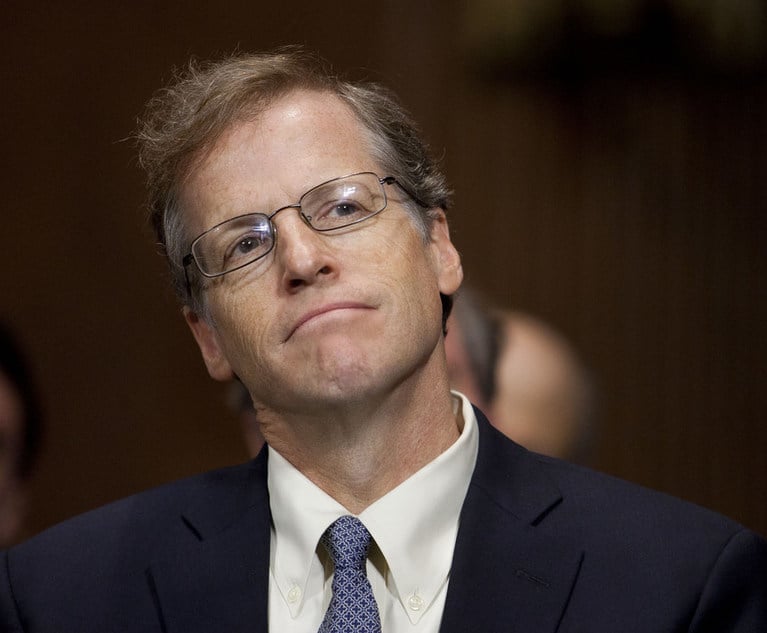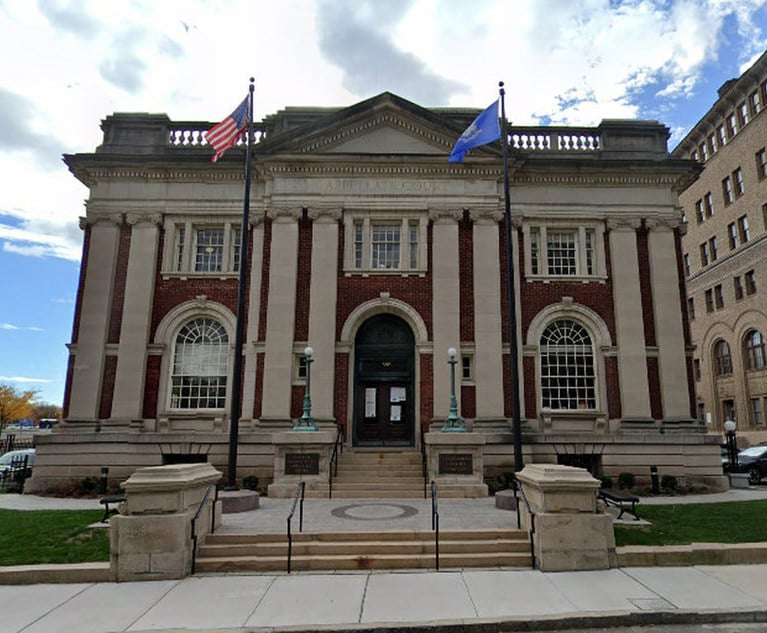Secret Settlements Can Conflict With Rules of Legal Ethics
What was the dam that's been holding back this flood of long-hidden sexual misconduct? Often, it's lawyer-drafted confidentiality agreements.
March 09, 2018 at 03:33 PM
5 minute read
 Every week seems to bring headlines of another rich and powerful man brought low by revelations of long-hidden sexual misconduct. The societal reactions of the #MeToo and #TimesUp movements have been big news, at the forefront of a current events tsunami.
Every week seems to bring headlines of another rich and powerful man brought low by revelations of long-hidden sexual misconduct. The societal reactions of the #MeToo and #TimesUp movements have been big news, at the forefront of a current events tsunami.
And what was the dam that's been holding back this flood? Often, it's lawyer-drafted confidentiality agreements. Time and again, the stories spill out despite the commonly used legal tool of a financial payoff with a promise of maximum secrecy. Movie mogul Harvey Weinstein, who maintains his innocence, has made frequent use of these.
Typically, and most dramatically in the case of adult-movie actress Stormy Daniels and President Donald Trump, the financially compensated party promises to keep quiet forever about a suit or a scandal, unless actually forced by court order to provide testimony.
Most people, and most lawyers in particular, have not pondered whether confidentiality agreements might be inherently unethical.
But more than a decade ago, professor Jon Bauer of the University of Connecticut School of Law made an intensive study of this. He concluded that secrecy agreements that impede disclosure of relevant evidence violate the legal code of ethics.
In “Buying Witness Silence: Evidence-Suppressing Settlements and Lawyers' Ethics,” Bauer cited the early drafters of the ethics code. They viewed the litigation process as a truth-finding exercise requiring unfettered access to potential evidence.
A 1935 ABA ethics opinion, No. 131, held: “It is improper for an attorney … to influence persons, other than his clients or their employees, to refuse to give information to opposing counsel which may be useful or essential to opposing counsel in establishing the true facts and circumstances affecting the dispute. … All persons who know anything about the facts in controversy are, in simple truth, the law's witnesses.”
That rule is alive and well in the ABA model rules, and Connecticut's Professional Responsibility Rule 3.4, which at subsection (6) states that a lawyer shall not request a person other than a client to refrain from voluntarily giving relevant information to another party.
The only exception is if the person is a client or client's employee whose interests would not be affected by the gag.
As Bauer noted in his article, published in the Oregon Law Review in 2008, lawyers are also officers of the court and are not permitted under Rule 8.4 to engage in conduct that is “prejudicial to the administration of justice.”
To the extent lawyers' secret settlements keep relevant evidence hidden, Bauer wrote, they undermine “the integrity of adversarial adjudication.”
Under the rules of evidence, “prior bad acts” are generally excluded, but there are a host of exceptions that allow evidence of patterns of behavior when relevant. These include serial sexual abuse.
State ethics boards are starting to agree with Bauer. There have been opinions in the past several years by the Chicago bar ethics committee and the Indiana state ethics committee endorsing Bauer's argument that lawyers should think long and hard before making nondisclosure agreements.
Another sign of the changing attitudes is buried in the new federal tax bill, which now prohibits businesses from writing off—as a cost of doing business—the money paid as settlements in sexual misconduct cases with confidentiality provisions.
“It's an interesting incentive,” said Bauer in an interview. “But when push comes to shove, the prospect of not being able to take it as a tax deduction won't prevent people and companies from entering into secrecy agreements, if they think it's in their interest.”
Bauer became interested in the ethical issue of secrecy provisions after a client of his legal clinic brought the issue into real-life focus.
Machine operator Felicia Martinez (a pseudonym) was abruptly fired for speaking Spanish in her English-only workplace and brought a federal discrimination claim. Her case concluded with a pretrial settlement and confidentiality provision.
If Martinez spoke of her case to others, she'd be liable to repay half the settlement amount.
Months after the settlement, she came to Bauer, distraught.
A co-worker with a similar discrimination claim wanted a witness statement from Martinez to help in pursuing a workplace discrimination claim.
But due to the settlement terms, Martinez had to refuse, at least until she was subpoenaed. The co-worker never pursued her claim, and Bauer could not keep from wondering whether the secrecy clause had prevented the co-worker from mounting a separate, meritorious case.
In some cases, it's the repetitive nature of the wrongdoing that is at the heart of the scandal, and that is when secrecy agreements have proved particularly pernicious, Bauer noted.
“When you think of the victims of pedophile priests in Boston and other places, many of them settled with confidentiality agreements,” he said. “Later, when they heard of other allegations against the same priests, they were not able to come forward and share highly relevant information with the people who had been victimized the same way.” People with new claims often would not know who to contact.
“They could, in theory, take a deposition of the person, but first they would have to decide to file suit, which you need to do before you can take a deposition,” Bauer noted. “It may be hard to get a lawyer to take their case if the lawyer is not able to establish that there have been prior similar complaints.”
And that is where the ethics issue comes in. If a meritorious case never gets off the ground due to a lawyer's confidentiality agreement, the agreement itself may well conflict with the rules of legal ethics.
This content has been archived. It is available through our partners, LexisNexis® and Bloomberg Law.
To view this content, please continue to their sites.
Not a Lexis Subscriber?
Subscribe Now
Not a Bloomberg Law Subscriber?
Subscribe Now
NOT FOR REPRINT
© 2025 ALM Global, LLC, All Rights Reserved. Request academic re-use from www.copyright.com. All other uses, submit a request to [email protected]. For more information visit Asset & Logo Licensing.
You Might Like
View All
35 Years After CT's Affordable Housing Act, Progress Remains a Struggle
4 minute read

Trending Stories
- 1Some Thoughts on What It Takes to Connect With Millennial Jurors
- 2Artificial Wisdom or Automated Folly? Practical Considerations for Arbitration Practitioners to Address the AI Conundrum
- 3The New Global M&A Kings All Have Something in Common
- 4Big Law Aims to Make DEI Less Divisive in Trump's Second Term
- 5Public Notices/Calendars
Who Got The Work
J. Brugh Lower of Gibbons has entered an appearance for industrial equipment supplier Devco Corporation in a pending trademark infringement lawsuit. The suit, accusing the defendant of selling knock-off Graco products, was filed Dec. 18 in New Jersey District Court by Rivkin Radler on behalf of Graco Inc. and Graco Minnesota. The case, assigned to U.S. District Judge Zahid N. Quraishi, is 3:24-cv-11294, Graco Inc. et al v. Devco Corporation.
Who Got The Work
Rebecca Maller-Stein and Kent A. Yalowitz of Arnold & Porter Kaye Scholer have entered their appearances for Hanaco Venture Capital and its executives, Lior Prosor and David Frankel, in a pending securities lawsuit. The action, filed on Dec. 24 in New York Southern District Court by Zell, Aron & Co. on behalf of Goldeneye Advisors, accuses the defendants of negligently and fraudulently managing the plaintiff's $1 million investment. The case, assigned to U.S. District Judge Vernon S. Broderick, is 1:24-cv-09918, Goldeneye Advisors, LLC v. Hanaco Venture Capital, Ltd. et al.
Who Got The Work
Attorneys from A&O Shearman has stepped in as defense counsel for Toronto-Dominion Bank and other defendants in a pending securities class action. The suit, filed Dec. 11 in New York Southern District Court by Bleichmar Fonti & Auld, accuses the defendants of concealing the bank's 'pervasive' deficiencies in regards to its compliance with the Bank Secrecy Act and the quality of its anti-money laundering controls. The case, assigned to U.S. District Judge Arun Subramanian, is 1:24-cv-09445, Gonzalez v. The Toronto-Dominion Bank et al.
Who Got The Work
Crown Castle International, a Pennsylvania company providing shared communications infrastructure, has turned to Luke D. Wolf of Gordon Rees Scully Mansukhani to fend off a pending breach-of-contract lawsuit. The court action, filed Nov. 25 in Michigan Eastern District Court by Hooper Hathaway PC on behalf of The Town Residences LLC, accuses Crown Castle of failing to transfer approximately $30,000 in utility payments from T-Mobile in breach of a roof-top lease and assignment agreement. The case, assigned to U.S. District Judge Susan K. Declercq, is 2:24-cv-13131, The Town Residences LLC v. T-Mobile US, Inc. et al.
Who Got The Work
Wilfred P. Coronato and Daniel M. Schwartz of McCarter & English have stepped in as defense counsel to Electrolux Home Products Inc. in a pending product liability lawsuit. The court action, filed Nov. 26 in New York Eastern District Court by Poulos Lopiccolo PC and Nagel Rice LLP on behalf of David Stern, alleges that the defendant's refrigerators’ drawers and shelving repeatedly break and fall apart within months after purchase. The case, assigned to U.S. District Judge Joan M. Azrack, is 2:24-cv-08204, Stern v. Electrolux Home Products, Inc.
Featured Firms
Law Offices of Gary Martin Hays & Associates, P.C.
(470) 294-1674
Law Offices of Mark E. Salomone
(857) 444-6468
Smith & Hassler
(713) 739-1250











